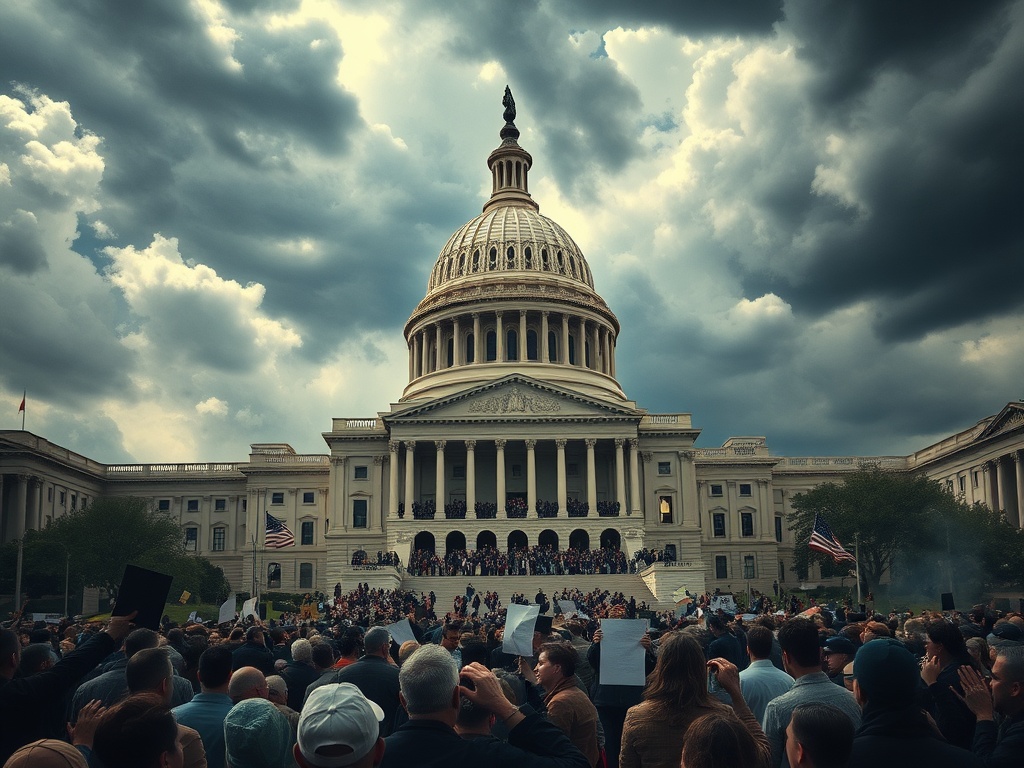America on the Brink of a Constitutional Crisis
Just a month into Donald Trump’s second term, there are growing concerns that America may be on the verge of a constitutional crisis—an unprecedented situation in the nation’s history. For many, that crisis is already unfolding. European leaders are grappling with Trump’s aggressive attempts to reshape the global security landscape. At the same time, domestically, Trump is implementing sweeping changes, including the dismissal of thousands of civil servants and the dismantling of entire government departments. He has even enlisted billionaire Elon Musk to identify so-called “woke” waste within the federal budget.
Critics argue that Trump is operating without the usual constraints that govern presidential actions. With the Republican Party holding control over both the House and the Senate, Trump enjoys a “trifecta” of power over the most influential branches of government. Alarmingly, many congressional Republicans seem content to let Trump govern largely unchecked. “Right now, you’ve got to give him space,” Senator John Thune remarked recently when discussing Trump’s radical alterations to longstanding U.S. foreign policy towards Russia.
On the Democratic side, the party is still reeling from Kamala Harris’s defeat to Trump in the previous November elections. They have struggled to respond effectively to the barrage of Trump’s executive orders, which range from attempts to terminate birthright citizenship to withdrawing from the World Health Organization. To date, numerous orders have faced judicial scrutiny, with ten judges ruling against the administration, suggesting that some level of oversight remains on Trump’s authority. However, a pressing question looms: what happens if Trump chooses to ignore the courts, bypassing Washington’s famed system of “checks and balances”? Who will rise to challenge him?
‘Not on This Scale, Not in This Way’
Meredith McGehee, an independent expert on congressional affairs based in Washington, D.C., notes that while U.S. presidents often enter office eager to push boundaries, Trump’s tactics—especially his disregard for constitutional norms—are without precedent. “People have tested the limits, but not on this scale and not in this manner,” she stated, leading her organization, McGehee Strategies.
A glaring illustration of this is Musk’s involvement with the newly established Department for Government Efficiency (DOGE), where his team has been granted unprecedented access to various government agencies. Musk claims he can identify $2 trillion in cuts within the federal budget. Though the exact number of federal employees who have lost their jobs as a result of these efforts remains unclear, at least 9,500 have been dismissed, with an additional 75,000 accepting voluntary buyouts.
These job losses span numerous sectors, including the Departments of Energy, Health and Human Services, Agriculture, and the Internal Revenue Service. Those who have been let go are often replaced by individuals loyal to the 78-year-old president. The dismissals appear erratic, with some key personnel being fired from the Department of Energy’s National Nuclear Security Administration, which is responsible for managing the nation’s nuclear arsenal and securing radiological materials globally. These employees were quickly reinstated once the critical nature of their roles was recognized by Musk’s team.
Last week, Michelle King, the acting head of the Social Security Administration, resigned after being ordered to provide highly sensitive personal data concerning millions of Americans to Musk’s team.
Pushback?
Some Republican lawmakers are expressing unease about the extent of Musk’s budget cuts, especially as polls indicate widespread unpopularity. With midterm elections looming, figures like Congressman Don Bacon of Nebraska are attempting to voice mild opposition without overtly criticizing the President. However, such dissent is rare. Generally, Republicans in Congress have stepped back from processes in which they would typically engage.
During a recent meeting at Trump’s Florida golf course, House Speaker Mike Johnson told his fellow Republicans that the president has been using his executive authority “in an appropriate manner.” He added, “Let’s not forget he ran on restoring common sense and fiscal responsibility, ensuring that government would be more efficient. It was a major theme of his campaign.”
Summarizing the “don’t-mess-with-Trump” sentiment prevailing among some Republican hardliners, Representative Marjorie Taylor Greene of Georgia warned her party’s Senators earlier this month that there would be “absolutely hell to pay” if they did not confirm the president’s cabinet nominees. “There is not a single Republican Senator that can win their elections without the Mega base in their state,” she cautioned, implying that any dissent could lead to primary challenges.
Indeed, only a handful of Republican senators voted against confirming some of Trump’s most contentious cabinet picks, including RFK Jr. for Secretary of Health and Human Services and former Democratic congresswoman Tulsi Gabbard as Director of National Intelligence.
Where Are the Democrats?
The rapid pace at which Trump has sought to implement change through executive actions has left Democrats reeling. On “President’s Day,” federal holiday marches against Trump erupted in cities across the nation, including Washington D.C., Orlando, Seattle, Boston, and Denver. However, unlike in 2016, when Trump defeated Hillary Clinton despite losing the popular vote, the organized resistance appears notably muted this time.
Democrats are still engaged in internal discussions about what went wrong in 2024 and how to better connect with voters on pressing issues. They are acutely aware that Trump not only won the popular vote but also secured victories in all seven swing states that determined the election, making significant inroads into traditionally Democratic voting demographics, including Black and Latino men.
Sandeep Kaushik, a Democratic strategist in Seattle who has worked extensively on various local and state campaigns, believes that as the party prepares for the 2026 midterms, it must demonstrate that it is attuned to voters’ concerns. “I think there is going to be a vibe shift. I think there will be a move away from ‘woke’,” she observed. “And because Republicans control everything in Washington D.C., local initiatives will gain more significance, such as state attorneys challenging Trump’s actions.”
Your Honor

Opponents of Trump remain hopeful that the judiciary will serve as a robust counterbalance. Several lower courts have already issued freezes on a number of his executive orders, including those pertaining to birthright citizenship. However, Trump is moving forward with appeals to the Supreme Court.
Recently, the Supreme Court was asked to determine whether the president has the authority to fire Hampton Dellinger, the head of an independent agency dedicated to protecting government whistleblowers, which could lead to a significant confrontation between different branches of government. A critical question lingers: what will happen if Trump openly defies court rulings, potentially leading the nation into what many experts believe could escalate to a full-blown constitutional crisis?
Last week, Trump reiterated a quote often attributed to Napoleon on his Truth Social platform: “He who saves his Country does not violate any Law.” Vice President JD Vance has even encouraged Trump to disregard the courts should they rule against him. “If a judge tried to tell a general how to conduct a military operation, that would be illegal,” he posted on social media. “If a judge tried to command the attorney general in how to use her discretion as a prosecutor, that’s also illegal. Judges aren’t allowed to control the executive’s legitimate power.”
McGehee, the congressional expert, does not believe that America has yet entered a constitutional crisis; however, she asserts that it will occur if Trump openly disregards court orders. “We’ll know whether we are truly in a constitutional crisis when the Supreme Court or some other court hands down an order and we see if this administration abides by it,” she explained. “Until then, we’re in a situation where he is challenging these norms, but that is primarily because Congress is allowing him to get away with it.”
‘Do What You Want’
In contrast, other experts argue that Trump’s actions may have already propelled the country into a full-blown crisis. Kirby Goidel, a political science professor at Texas A&M University, asserts that there is no modern parallel for Trump’s aggressive attempts to consolidate control over the government. He believes that the lack of resistance from congressional Republicans makes this situation exceptionally alarming. “I can’t think of a time where at least some Republican members of Congress didn’t think of themselves as institutionalists,” he remarked. “This Congress has essentially said, ‘do what you want.’”
Goidel adds, “We must be concerned about what it signifies if we are to live in a democracy without a legislative branch willing to stand up.” In another indication of Trump’s strategy to assert control over traditionally independent institutions, he signed an executive order this week placing several agencies—such as the Federal Election Commission, the Federal Communications Commission, the Securities and Exchange Commission, and the Federal Trade Commission—under his jurisdiction. Notably, the Federal Reserve’s Board of Governors and Open Market Committee were excluded from this order.
The Will of the People?
The White House has categorically denied any wrongdoing on Trump’s part. “It’s extremely rich of Democrats to express concern over a constitutional crisis when they have been complicit in creating the greatest constitutional crisis in American history—using all three branches of government as weapons against President Trump,” declared Principal Deputy Press Secretary Harrison Fields. “The real crisis Democrats face is their inability to accept defeat; elections have consequences, and the American people decisively rejected their failed resistance strategies at the ballot box.”
For many Trump supporters, the president is simply fulfilling the promises made during his campaign. Janie Frenette, a 72-year-old Trump supporter from the critical state of Arizona, believes the president has adhered to his commitments, particularly regarding immigration and economic issues. She does not perceive his actions as overstepping presidential authority. “Everything he’s done has been legal. They’re always trying to compare him to Hitler and other absurdities. Well, Hitler didn’t have free speech, and you didn’t have more than one party to vote for,” she asserted from Pinal County. “I think he’s doing a pretty good job. He’s doing what he said he would do, and that’s what 77 million people voted for.”




